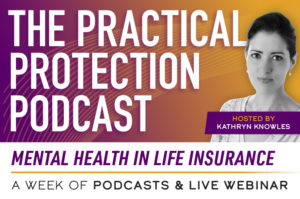The PPP - Mental Health in Life Insurance
Request a Callback
By clicking on submit I / We give consent for you to call me / us on the number provided to discuss my / our financial requirements.
Caring - Understanding - Reliable - Advice
Home » Guides & News » The PPP – Mental Health In Life Insurance Week

Mental Health In Life Insurance Week
This week the Practical Protection Podcast is focusing on Mental Health in Life Insurance, with an episode each day and a live webinar to finish things off. This is being done in conjunction with Cover and the Institute and Faculty of Actuaries Mental Health Working Group.
These episodes will delve into how mental health and protection insurance mix, as well as why you might need protection insurance and how to get it. Kathryn and her guests also discuss how and why insurers and underwriters make their decisions, and what exactly happens if you need to claim on your policy.
Day 1 – Needing Insurance
Starting off the week as we mean to go on, Kathryn is joined by special guest Lynn Beattie, aka Mrs Mummypenny. Having protection insurance in place can take a big weight off your shoulders, and the relief from knowing you have protection in place is second to none.
Financial security is the priority of many people, especially after the recent pandemic really brought to light the uncertainty that life brings. Having a family is a great reason to take out insurance, and Lynn explains her insurance journeys for life insurance and income protection.
A lot of people go without insurance, partly because they might not quite understand exactly why or what they need. It can be confusing for everybody, even sometimes those who work within the industry, so you’re definitely not alone if you’re not too sure where to start.
Mental health can impact your insurance journey and the terms that you’re offered. Kathryn and Lynn talk about how exactly things might be affected, and the need for spotting a vulnerability. There are many things which can make a person seem vulnerable and noticing this at an early stage can be quite important.
Day 2 – Routes To Insurance
Day two brings a new set of experts. Neal Cross from MoneySupermarket, Phil Jeynes from Reassured and Alan Knowles from Cura Financial Services feature on the podcast. The topic of this episode is how to get insurance, and what ways might suit a person’s mental health needs.
There are a number of different ways to take out protection insurance, each has pros and cons and can help people in different ways.
There are now a number of online comparison sites, such as MoneySupermarket, where you can go online to find the different insurances available to you. This might be great for a person who is after a quick insurance journey, or who doesn’t necessarily feel comfortable talking to a person face to face or on the phone, about their own personal circumstances.
Whereas for others, they might wish to have a person there to talk to and offer support throughout the process. Though MoneySupermarket doesn’t offer any advice, they do signpost to a broker who can assist people over the phone where needed.
On the other hand, you might choose to speak to somebody to take out your insurance. When going down this route, you will find advised or non-advised options. Though the process is similar, the outcome could potentially be quite different.
Reassured is a non-advised route, meaning that they will take your information and help with the application process and can explain how everything works, but there won’t be any points where they offer advice. The insurance policies which they source for you will meet the criteria you have set, rather than having an adviser look into what they think may be more suitable. This really suits a person who has an idea of what it is that they want to buy, or maybe just wants a little bit of confirmation before purchasing anything.
Cura Financial Services is an advised route. After explaining your circumstances to one of our advisers, we then research into the best insurer for your needs and make a recommendation on exactly what type of cover and how much might be suitable. Different advisers work in different ways, some may be face to face whereas others may do things over the phone. At Cura, the majority of conversations are had over the phone which can make things a little easier for a person talking about their mental health background, as disclosing certain things in person can be nerve wracking.
An advised route can be good for a person who isn’t sure about what they want, but maybe just knows they need something in place. It could be that you think you need one product but something else suits better, or a different sum assured is more appropriate, this is where an advised route can really be beneficial.
Day 3 – Access To Insurance
On day three, Kathryn talks with Lisa Balboa from Hannover Re and Fraser Ballantine from Zurich. This may be one of the rare times that there’s an adviser, actuary and underwriter all sat together talking about protection insurance.
The topic of conversation is about how insurers come up with the prices that they offer, and we give an example of how premiums might be increased due to mental health.
In order for an underwriter to make a decision on an application, there are a number of things they will need to look at. They will assess how certain circumstances influence a person’s chance of being seriously ill or dying, as well as looking into the individual circumstances of the applicant.
Insurers use population studies to understand how different medical conditions can have an effect, which is a slight issue that came up at the start of the Covid pandemic. As it was quite sudden, there had been little research into its effects, leaving insurers uncertain.
Day 4 – Claims and Support
The final episode of the Mental Health Awareness Week sees Kathryn joined by Vanessa Sallows from Legal & General and Monica Garcia from Monica Garcia Consulting.
Mental health is one of the leading causes for claims on income protection policies, which is why many insurers now try to implement early intervention and have mental health services available to their policyholders. As people, we’ve all got the propensity to have mental illness or physical illness at any given point in time, which has been highlighted by Covid.
The main focus of this episode is the mental health support available when you have a protection policy in place. Before, during and after a claim is made, there is often help at hand. There are a number of examples discussed, such as rehabilitation consultations to help a person transition back into work after absence.
Webinar
The last day of the week hosts a live webinar where Kathryn, Lisa Balboa and Fraser Ballantine talk about key areas of mental health and insurance.
During the episode, hosted by John Brazier from Cover, they explore data analysis, decision making, application wording and the huge steps that have been made over the past decade.
If you want to listen back to any of the other podcasts, click here.
If you would like to know more about how to arrange protection insurance, take a look at Kathryn’s new Protection Insurance in Practice course here.
If you have listened to this episode of the podcast for your work, don’t forget to claim your CPD certificate: https://practical-protection.co.uk/claim-your-cpd/
Categories: Practical Protection Podcast
Client Reviews








Talk to a Friendly Adviser
Get a Quote
What We Offer?
- Experienced and knowledgeable advisers
- Specialist advice with no fees to pay
- Full assistance with all of your paperwork
- Put your policy into trust at no cost
- A dedicated insurance adviser for you
Our Recent Awards






















